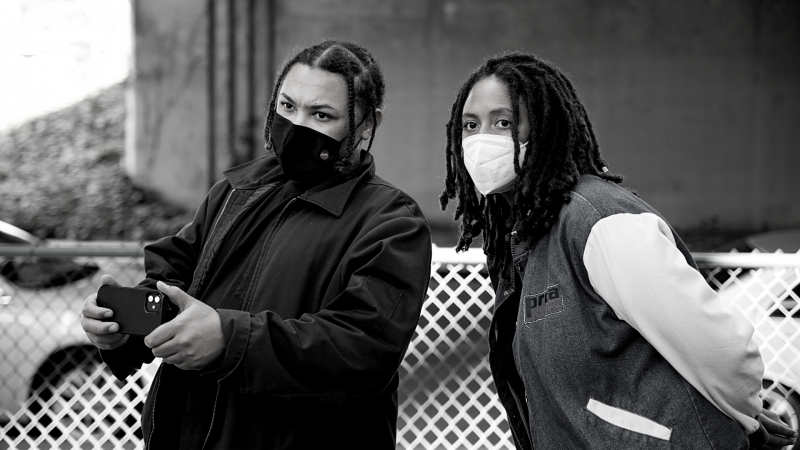But behind the scenes is the real story: Alba and Jon have come together to create a working relationship that’s balanced and productive, and evidently this workflow rubs off on the people around them.
In this episode, we discuss how the filmmakers work together to build suspense in their stories, pray to film gods that their scenes are captured correctly and collaborate with the community to create cinema.
Below are lightly edited excerpts of my conversation with Alba Roland Mejia and Jon Warfield Harrison.
Pen: What was the first piece that you two collaborated on?
Jon: We did My Own Mecca together…
Alba: Basically it’s a day in the life of a young Black man in the Bay Area… how he understands who he is in his reality. It’s about the microaggressions that we don’t really talk about too much. It’s about the issues that we have within our household or within our friendships. And being in situations in which we’re supposed to feel safe and we don’t.
Pen: How do you make those moments so big and intense? Like, I’m nervous and squeamish watching ’em. How did you do that?
Alba: [The two characters] have this tendency to battle for dominance. And there’s these subtle digs that they do with each other in order to determine who is in control of the conversation, even though they’re both friends and they both genuinely love each other.
Jon: If you’re just talking to somebody or in a tense situation… It’s hard to maintain that eye contact because you feel that intensity. And I feel like through the film, we’re able to really capture those moments of the glare that they have towards each other. But through the editing, we’re able to let it sit there for a few seconds and you really absorb that intensity.
Pen: Jon, why did you feel pulled to shoot on film?
Jon: Just the fact that celluloid is like a physical thing you can hold in your hand… when it’s in the camera, it’s physically capturing that light onto it. So it’s truly there in that moment with you and it’s never going to be the same. So it’s almost like a living organism with you capturing this story and like ingraining in it physically in this earth. Through the years, it’s been getting better and better for darker skin tones as well.
Alba: He said it was like a living organism… I hadn’t experienced it before. When the camera is on and rolling, you can hear it breathing as if it was like a heartbeat right next to your face.
Pen: How does it feel to have a tag team partner as a director and a cinematographer… do you feel like your wide receiver and quarterback? Are you coach and offensive coordinator?
Alba: I wouldn’t even say it’s like a quarterback and a receiver, I would say it’s like a tag team wrestling match. We both got a common goal and we take turns and we know each other’s strengths.
Alba: For example, this most recent project that we’re working on, Blackness is Everything, there was something that I kind of just threw at them, like, oh, I want to shoot slow motion on film in black and white. And he did the research to make sure that he knew before coming to set how many stops the lighting needs to be to be in slow motion and in black and white, because all these things matter, all these little details matter. Something I didn’t realize. I just know what I wanted it to feel like. And John knows how to make it happen.
Pen: Was there a moment that stands out to you like that just extremely fun, chaotic thing that happened on either of the sets that you worked on together?
Alba: Our first day of shooting My Own Mecca, we had about 30 folks and we’re in West Oakland. It’s a big group of people. So naturally, the whole community, one by one, would come out to us… stop the whole production, ask what we’re doing, introduce themselves, tell us about their life. I love that. It did stop production quite a bit, but I loved how interested and open and receptive they were to us.
Jon: Some of those people who came up, they ended up staying in the background of the film. And I remember I was just sitting back there, hands on my hips, watching everything. And it was just beautiful to see, like a collaboration between like 25 different humans, and then all these people in the background we didn’t even really know, just coming together to make a movie in Oakland.

Rightnowish is an arts and culture podcast produced at KQED. Listen to it wherever you get your podcasts or click the play button at the top of this page and subscribe to the show on NPR One, Spotify, Apple Podcasts, TuneIn, Stitcher or wherever you get your podcasts.



